In terms of my reading plans for 2025, mentally laid out at the end of last month, this read was a totally unexpected curveball. The book (and author) wasn’t one I’d ever heard of, and not one I’d have bothered to pick up even on a free rack; but it was a surprise Christmas gift from a library colleague, delivered early this month when we returned from Christmas break, and one that touched me deeply. As a gift from one librarian to another, it actually has a lot to commend it, being very library-centered and with a message very supportive of books and the importance of the written word.
Written for younger readers (ages 10-14, according to the Goodreads description), this is the opening book of what’s so far a duology. Author Downey describes the premise and genesis of the series in an answer to a question by another Goodreader, which is worth quoting from at length:
“I think the seed for the series was planted when I saw the phrase “Petrarch’s Library” scrawled on a notebook I found in our never-very-organized, and always-very-clutterful house. Everyone in the family denied being the scrawler, but the phrase ignited my imagination, especially after I looked it up and found it associated with a collection of books that the 14th century humanist and poet, Petrarch, had carried around with him when he traveled on the back of a donkey. That made me laugh, because the phrase had suggested some sort of grand magnificent library. But then I thought, well, even a small collection of books IS a sort of imaginary grand magnificent place because each of the books is a doorway into a different world of ideas, and knowledge, and story.
Suddenly I was imagining “Petrarch’s Library” as a solid, if sprawling building, made out of library chambers from different times and places knitted together by magic into one incredible super-library.
Since I was a kid, I always had the feeling that librarians were masquerading at doing something mundane while actually doing something incredible, mysterious and magical. It seemed reasonable that the work of librarians who staffed the imaginary Petrarch’s Library would defend and protect the flow of information in shall we say, some additional warrior-ish direct action ways!”
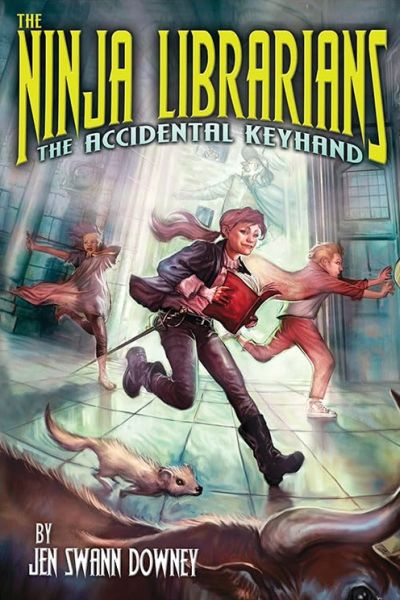 (That quote also answers the question of whether this is fantasy or science fiction; that would depend on whether the author intended us to view the speculative elements as enabled by magic –which, as noted above, she did!– or by natural phenomena/technology unknown to present science.) 12-year-old protagonist Dorothea “Dorrie” Barnes is a library-loving kid growing up in Passaic, New Jersey (I suspect this might be Downey’s hometown, but can’t confirm that), in a chaotic household with her inventor father, college instructor mom, 14-year-old brother Marcus, and three-year-old sister Miranda. (The family shares the house with her great-aunt Alice, who’s an anthropologist.) Dorrie’s a pretty ordinary tween, albeit one with a sense of justice and a liking for the idea of sword-fighting against villains; she’s got a blunt practice sword and takes a library-sponsored fencing and stage combat class. But when the book opens on the day of the library’s annual Pen and Sword Festival (a sort of low-budget Renaissance Faire), a succession of freak events will very soon suck Dorrie and Marcus into a most un-ordinary experience….
(That quote also answers the question of whether this is fantasy or science fiction; that would depend on whether the author intended us to view the speculative elements as enabled by magic –which, as noted above, she did!– or by natural phenomena/technology unknown to present science.) 12-year-old protagonist Dorothea “Dorrie” Barnes is a library-loving kid growing up in Passaic, New Jersey (I suspect this might be Downey’s hometown, but can’t confirm that), in a chaotic household with her inventor father, college instructor mom, 14-year-old brother Marcus, and three-year-old sister Miranda. (The family shares the house with her great-aunt Alice, who’s an anthropologist.) Dorrie’s a pretty ordinary tween, albeit one with a sense of justice and a liking for the idea of sword-fighting against villains; she’s got a blunt practice sword and takes a library-sponsored fencing and stage combat class. But when the book opens on the day of the library’s annual Pen and Sword Festival (a sort of low-budget Renaissance Faire), a succession of freak events will very soon suck Dorrie and Marcus into a most un-ordinary experience….
With 358 pages of actual text, this is a rather thick book; but it has fairly large script, and is a quick-flowing page turner. Given that it’s intentionally written for kids, it’s safe to say (and no disgrace to the author!) that it would appeal more to that group than to adults; and while it’s among those children’s books that can please adults, it’s much more towards the younger-age end of that spectrum than some. Probably its biggest problem is conceptual murkiness, which makes suspension of disbelief challenging (more so for adults than for most 10-14 year-olds). The circumstances behind the rise of the Foundation and later of its Lybrariad adversaries aren’t really explained, and neither is the power behind the magic of Petrarch’s library and why its details work the way they do (partly because the Lybrarians themselves don’t know or understand this!). Because the author conceives of time as fluid, with past events subject to change which can re-write subsequent ones, time paradoxes are a factor, and that’s definitely not my favorite time-travel trope. Also, Downey’s perspective is secular humanist, though the book doesn’t stress this. The issue of language differences in certain settings isn’t always handled convincingly, IMO.
However, there are definite pluses here as well. On the whole, the plot is a serious one, with real suspense and tension in many places and a definite potential risk of death at times, and there are some serious life lessons imparted and significant moral choices made; but the author leavens this with a good deal of both situational and verbal humor, which works well here. She’s obviously well-read and knowledgeable about history, geography, natural history, etc., and she constructs her plot well for the most part (though there’s a significant logical hole in the part played by one magical artifact). Dorrie’s well-developed and likeable; most of the other characters who get any significant page-time are well-developed also, though not always likeable nor meant to be. (Marcus is, though you might sometimes want to swat him! :-) ) A nice touch is the incorporation of several real historical figures, such as Cyrano de Bergerac and Greek philosopher Hypatia, as members of the Lybrariad, though their portrayal isn’t always necessarily realistic. (I appreciated the short appendices which identify most of these people, and give additional information about other real persons, places, books, and other items mentioned in the tale.)
Since Dorrie is only 12 years old, she’s not a very formidable fighter in serious combat. But within the limits of her physical growth and of what training she’s had, she actually does display some action heroine chops, albeit not until quite a ways into the book.
All in all, this is not deep fiction, and I don’t plan to seek out the sequel. But it’s an enjoyable romp on its own terms, and I don’t regret reading it. (Note for animal-loving readers: the pet mongoose who plays an important role in the storyline is not harmed in any way!)
Author: Jen Swann Downey
Publisher: Sourcebooks, available through Amazon, both for Kindle and as a printed book.
A version of this review previously appeared on Goodreads.
 It generally makes sense for a film to escalate over its duration. The problem here is, what escalated was my annoyance. It began as irritation, but by the end I was deeply peeved, because the stupidity is strong in this one. It begins with two different strands. In one, former desperado Lee Hughes is visited in his mountain resort by ex-colleague Jimmy Montague (Fafard) and his minions. They want to know the location of two million in proceeds from a previous crime Lee and Jimmy pulled. In the other, lesbian couple Lane (Newton) and Megan (McClay) are busy being lesbionic with each other, because they’re lesbians. Did I mention they are a same-sex couple?
It generally makes sense for a film to escalate over its duration. The problem here is, what escalated was my annoyance. It began as irritation, but by the end I was deeply peeved, because the stupidity is strong in this one. It begins with two different strands. In one, former desperado Lee Hughes is visited in his mountain resort by ex-colleague Jimmy Montague (Fafard) and his minions. They want to know the location of two million in proceeds from a previous crime Lee and Jimmy pulled. In the other, lesbian couple Lane (Newton) and Megan (McClay) are busy being lesbionic with each other, because they’re lesbians. Did I mention they are a same-sex couple?




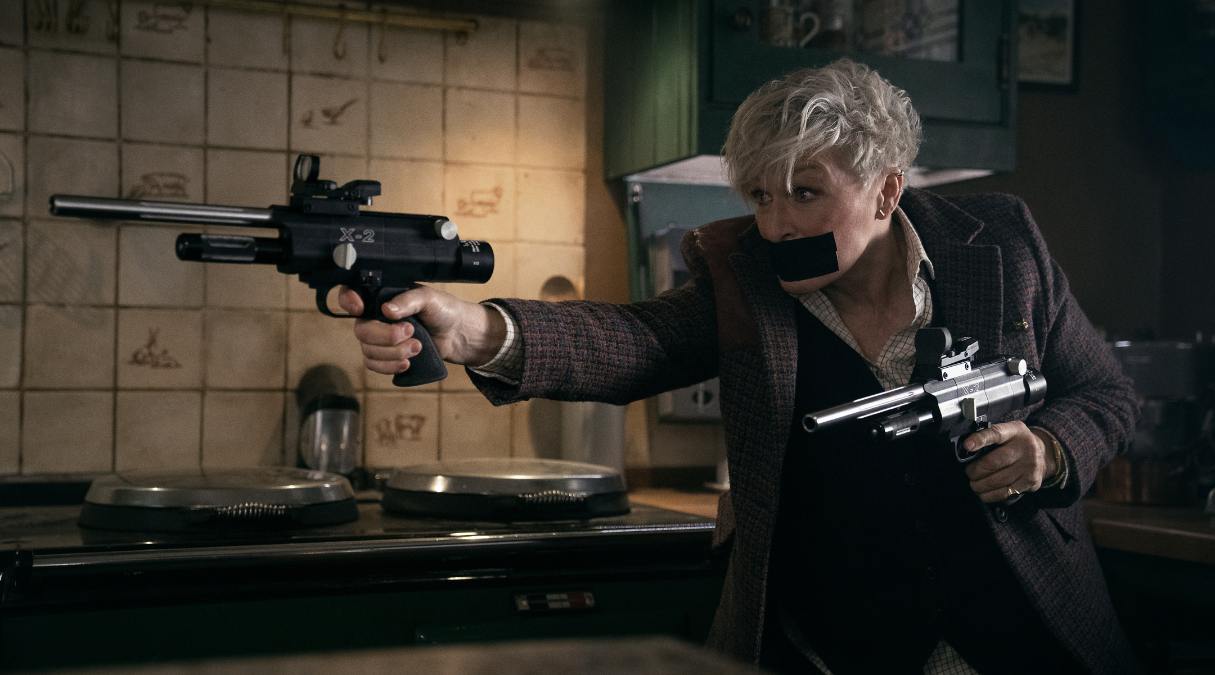 ★★★
★★★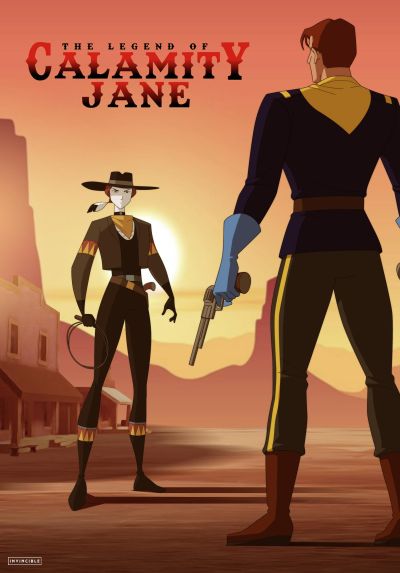 Martha Jane Cannary Burke, a.k.a. “Calamity Jane” (1852-1903) was a lot of things. But most of all she was the inventor of her own legend. By the end of the 19th century, dime novels based off her alleged adventures already sold very well. Unfortunately, the foul-mouthed and constantly drunk former frontier woman could never benefit financially from her reputation, with which others earned good money. She died early, though already perceived as a legend of the “old West”. To divide which of the many stories told about her are true, and which are not, is a job for the historians, not mine. For a character who definitely provided a “fill in the gaps” hero’s template, it’s no surprise Calamity Jane soon became a mythic legend of the “Wild West”, combined with other illustrious characters of that time such as “Wild Bill” Hickok, Wyatt Earp, Doc Holliday, Billy the Kid and many others.
Martha Jane Cannary Burke, a.k.a. “Calamity Jane” (1852-1903) was a lot of things. But most of all she was the inventor of her own legend. By the end of the 19th century, dime novels based off her alleged adventures already sold very well. Unfortunately, the foul-mouthed and constantly drunk former frontier woman could never benefit financially from her reputation, with which others earned good money. She died early, though already perceived as a legend of the “old West”. To divide which of the many stories told about her are true, and which are not, is a job for the historians, not mine. For a character who definitely provided a “fill in the gaps” hero’s template, it’s no surprise Calamity Jane soon became a mythic legend of the “Wild West”, combined with other illustrious characters of that time such as “Wild Bill” Hickok, Wyatt Earp, Doc Holliday, Billy the Kid and many others.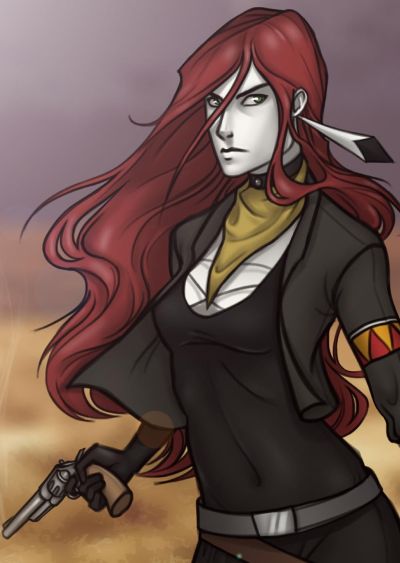 The show itself takes place around 1876 and is great fun. Calamity Jane is an adult, red-haired and green-eyed woman, with a whip that regularly comes in handy for dangerous situations. She is serious-minded and on the side of the law, meaning whenever help is needed, she will be there. She has a horse called Dakota and drinks milk (hey, what do you expect – it’s made for kids!). Always on her side is old Joe Presto (Welker) who can best be described as her comic sidekick, though sometimes comes across a bit simple-minded. Also, I sometimes had problems understanding his mumbling, though you get used to it. Of course, when you tell the story of Calamity Jane, Wild Bill Hickok is never far away. In real life she claimed that they were a couple in Deadwood. though according to historians, this could easily be another made-up story, as she was famous for doing. In this show, he helps her from time to time and is voiced by Clancy Brown (the Kurgan from Highlander).
The show itself takes place around 1876 and is great fun. Calamity Jane is an adult, red-haired and green-eyed woman, with a whip that regularly comes in handy for dangerous situations. She is serious-minded and on the side of the law, meaning whenever help is needed, she will be there. She has a horse called Dakota and drinks milk (hey, what do you expect – it’s made for kids!). Always on her side is old Joe Presto (Welker) who can best be described as her comic sidekick, though sometimes comes across a bit simple-minded. Also, I sometimes had problems understanding his mumbling, though you get used to it. Of course, when you tell the story of Calamity Jane, Wild Bill Hickok is never far away. In real life she claimed that they were a couple in Deadwood. though according to historians, this could easily be another made-up story, as she was famous for doing. In this show, he helps her from time to time and is voiced by Clancy Brown (the Kurgan from Highlander). This is now the third film with the same title to be reviewed on the site: no
This is now the third film with the same title to be reviewed on the site: no 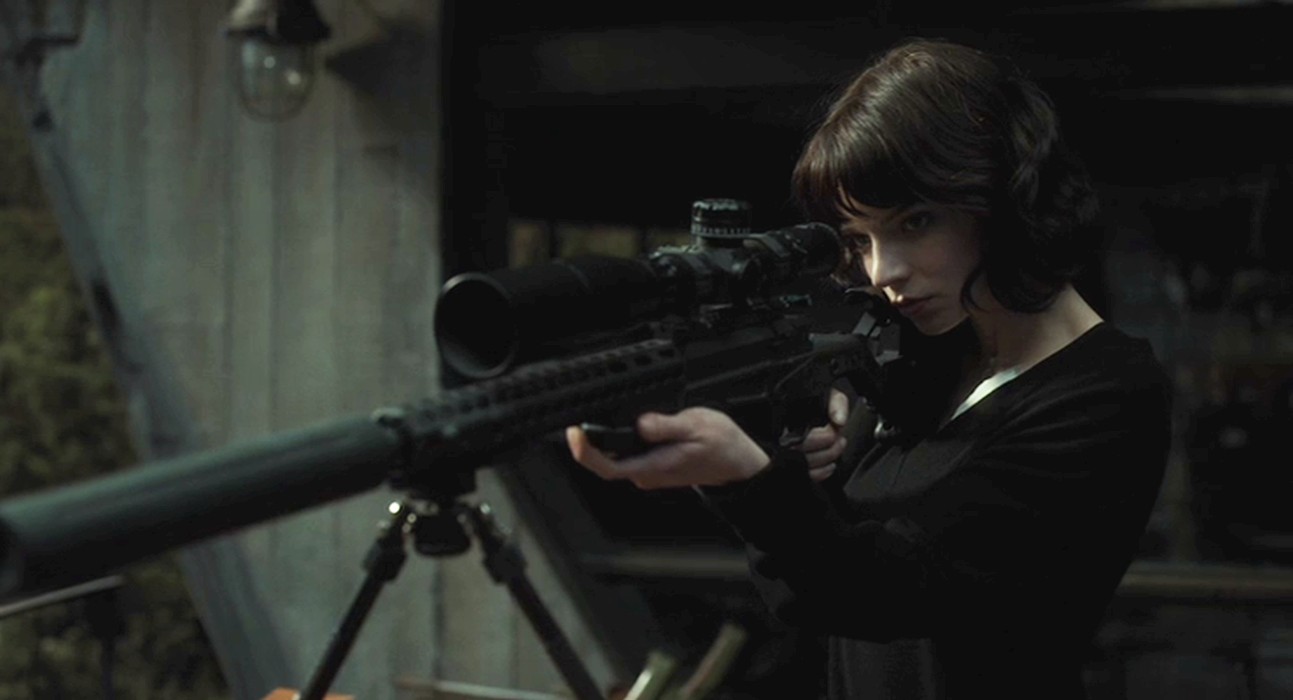 ★★★½
★★★½ (That quote also answers the question of whether this is fantasy or science fiction; that would depend on whether the author intended us to view the speculative elements as enabled by magic –which, as noted above, she did!– or by natural phenomena/technology unknown to present science.) 12-year-old protagonist Dorothea “Dorrie” Barnes is a library-loving kid growing up in Passaic, New Jersey (I suspect this might be Downey’s hometown, but can’t confirm that), in a chaotic household with her inventor father, college instructor mom, 14-year-old brother Marcus, and three-year-old sister Miranda. (The family shares the house with her great-aunt Alice, who’s an anthropologist.) Dorrie’s a pretty ordinary tween, albeit one with a sense of justice and a liking for the idea of sword-fighting against villains; she’s got a blunt practice sword and takes a library-sponsored fencing and stage combat class. But when the book opens on the day of the library’s annual Pen and Sword Festival (a sort of low-budget Renaissance Faire), a succession of freak events will very soon suck Dorrie and Marcus into a most un-ordinary experience….
(That quote also answers the question of whether this is fantasy or science fiction; that would depend on whether the author intended us to view the speculative elements as enabled by magic –which, as noted above, she did!– or by natural phenomena/technology unknown to present science.) 12-year-old protagonist Dorothea “Dorrie” Barnes is a library-loving kid growing up in Passaic, New Jersey (I suspect this might be Downey’s hometown, but can’t confirm that), in a chaotic household with her inventor father, college instructor mom, 14-year-old brother Marcus, and three-year-old sister Miranda. (The family shares the house with her great-aunt Alice, who’s an anthropologist.) Dorrie’s a pretty ordinary tween, albeit one with a sense of justice and a liking for the idea of sword-fighting against villains; she’s got a blunt practice sword and takes a library-sponsored fencing and stage combat class. But when the book opens on the day of the library’s annual Pen and Sword Festival (a sort of low-budget Renaissance Faire), a succession of freak events will very soon suck Dorrie and Marcus into a most un-ordinary experience….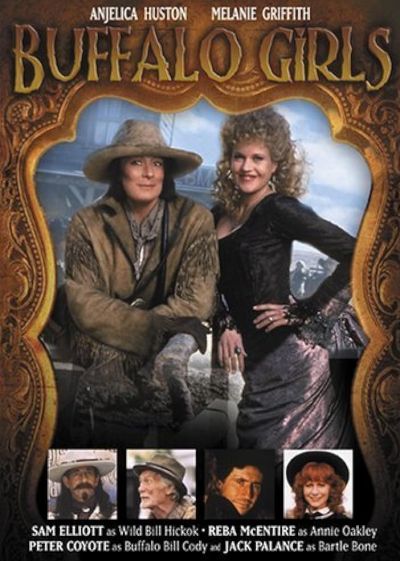 Calamity Jane is one of the larger-than-life figures who populated the Wild West in its later days, as it was gradually becoming civilized. The truth about who she was is hard to determine, with verifiable facts hard to come by. But like Robin Hood, this just makes her raw clay, to be moulded into whatever shape writers and film-makers want. In Jane’s case this means her over the decades being played by anyone from
Calamity Jane is one of the larger-than-life figures who populated the Wild West in its later days, as it was gradually becoming civilized. The truth about who she was is hard to determine, with verifiable facts hard to come by. But like Robin Hood, this just makes her raw clay, to be moulded into whatever shape writers and film-makers want. In Jane’s case this means her over the decades being played by anyone from  Always a pleasure to cross another country off the map, and this is the first movie we have ever reviewed here from Nigeria. Indeed, entries from anywhere in Africa have been very limited, and in general, I found this a pleasant surprise. In some countries, film-makers appear to be trying simply to imitate Hollywood. That’s not the case here: this
Always a pleasure to cross another country off the map, and this is the first movie we have ever reviewed here from Nigeria. Indeed, entries from anywhere in Africa have been very limited, and in general, I found this a pleasant surprise. In some countries, film-makers appear to be trying simply to imitate Hollywood. That’s not the case here: this  Not long ago, I tagged
Not long ago, I tagged 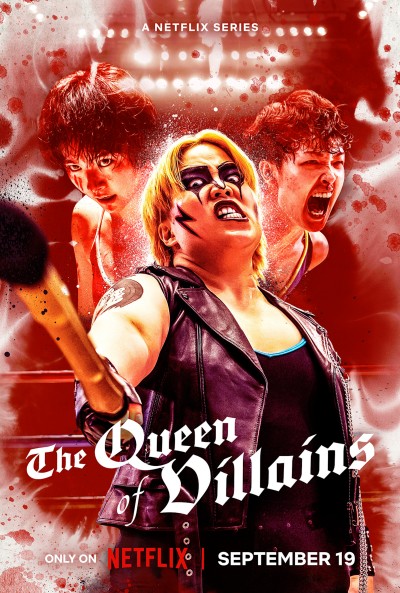 We all know professional wrestling is staged, with the outcomes predetermined, right? [Do not used the word “fake”: I will cut you!] Here, things are… murkier. This treads a delicate line between that and kayfabe, the wrestling term for promoting it as reality, and genuine competition. The stance here is interesting, suggesting that while those in charge, like promoter Toshikuni Matsunaga (Saitoh), can have a result in mind, that relies on those in the ring agreeing to it. This isn’t always the case [one wrestling show I remember attending definitely had a genuine fight, for backstage reasons], and here, Matsumoto is a loose cannon, prepared to go to any lengths to put herself over. Or her character: the lines are certainly blurred here, to the point of near invisibility.
We all know professional wrestling is staged, with the outcomes predetermined, right? [Do not used the word “fake”: I will cut you!] Here, things are… murkier. This treads a delicate line between that and kayfabe, the wrestling term for promoting it as reality, and genuine competition. The stance here is interesting, suggesting that while those in charge, like promoter Toshikuni Matsunaga (Saitoh), can have a result in mind, that relies on those in the ring agreeing to it. This isn’t always the case [one wrestling show I remember attending definitely had a genuine fight, for backstage reasons], and here, Matsumoto is a loose cannon, prepared to go to any lengths to put herself over. Or her character: the lines are certainly blurred here, to the point of near invisibility.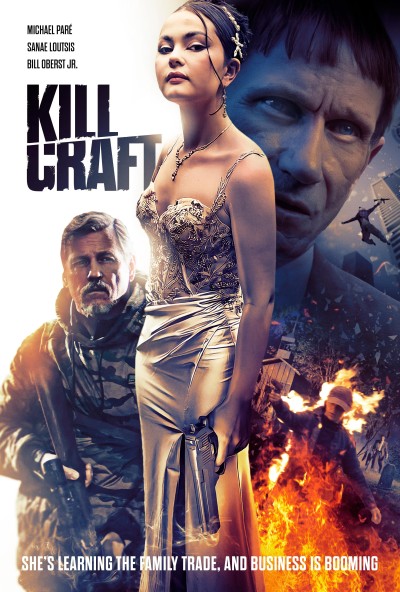 There is potential in the idea here. It’s a shame it ends up feeling like two separate movies, both of which come out feeling under-cooked. The main focus is on Marina Delon (Loutsis), a teenage girl with the typical teenage girl problems, e.g. bickering parents, generally sullen demeanour, etc. Except, her dad Thomas (Paré) is actually an assassin, working for the very strange Poe (Oberst). This has contributed to the marital strife, because his work is why mom is in a wheel-chair – and is not happy about it, to put it mildly. However, things are up-ended after Thomas is killed on a job, and Marina decides to take over the family business.
There is potential in the idea here. It’s a shame it ends up feeling like two separate movies, both of which come out feeling under-cooked. The main focus is on Marina Delon (Loutsis), a teenage girl with the typical teenage girl problems, e.g. bickering parents, generally sullen demeanour, etc. Except, her dad Thomas (Paré) is actually an assassin, working for the very strange Poe (Oberst). This has contributed to the marital strife, because his work is why mom is in a wheel-chair – and is not happy about it, to put it mildly. However, things are up-ended after Thomas is killed on a job, and Marina decides to take over the family business.